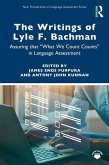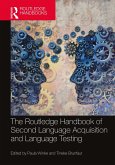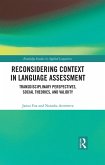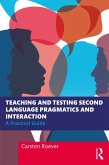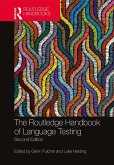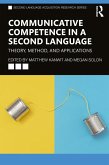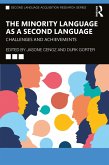The Writings of Lyle F. Bachman (eBook, PDF)
Assuring that "What We Count Counts" in Language Assessment
Redaktion: Purpura, James Enos; Kunnan, Antony John


Alle Infos zum eBook verschenken

The Writings of Lyle F. Bachman (eBook, PDF)
Assuring that "What We Count Counts" in Language Assessment
Redaktion: Purpura, James Enos; Kunnan, Antony John
- Format: PDF
- Merkliste
- Auf die Merkliste
- Bewerten Bewerten
- Teilen
- Produkt teilen
- Produkterinnerung
- Produkterinnerung

Hier können Sie sich einloggen

Bitte loggen Sie sich zunächst in Ihr Kundenkonto ein oder registrieren Sie sich bei bücher.de, um das eBook-Abo tolino select nutzen zu können.
As one of the most recognized names in the fields of language assessment and applied linguistics, Lyle F. Bachman has produced a high volume of scholarly articles and books in the field of language assessment. These writings have strongly influenced the discipline and over the last three decades have played an uncontested role in shaping the field as we know it today. Until now, Bachman's work has been spread across various mediums and not existed in one place. The Writings of Lyle F. Bachman is the first book to assemble Bachman's work into a single, comprehensive volume.
The collection is…mehr
- Geräte: PC
- mit Kopierschutz
- eBook Hilfe
![The Writings of Lyle F. Bachman (eBook, ePUB) The Writings of Lyle F. Bachman (eBook, ePUB)]() The Writings of Lyle F. Bachman (eBook, ePUB)48,95 €
The Writings of Lyle F. Bachman (eBook, ePUB)48,95 €![The Routledge Handbook of Second Language Acquisition and Language Testing (eBook, PDF) The Routledge Handbook of Second Language Acquisition and Language Testing (eBook, PDF)]() The Routledge Handbook of Second Language Acquisition and Language Testing (eBook, PDF)45,95 €
The Routledge Handbook of Second Language Acquisition and Language Testing (eBook, PDF)45,95 €![Reconsidering Context in Language Assessment (eBook, PDF) Reconsidering Context in Language Assessment (eBook, PDF)]() Janna FoxReconsidering Context in Language Assessment (eBook, PDF)40,95 €
Janna FoxReconsidering Context in Language Assessment (eBook, PDF)40,95 €![Teaching and Testing Second Language Pragmatics and Interaction (eBook, PDF) Teaching and Testing Second Language Pragmatics and Interaction (eBook, PDF)]() Carsten RoeverTeaching and Testing Second Language Pragmatics and Interaction (eBook, PDF)39,95 €
Carsten RoeverTeaching and Testing Second Language Pragmatics and Interaction (eBook, PDF)39,95 €![The Routledge Handbook of Language Testing (eBook, PDF) The Routledge Handbook of Language Testing (eBook, PDF)]() The Routledge Handbook of Language Testing (eBook, PDF)45,95 €
The Routledge Handbook of Language Testing (eBook, PDF)45,95 €![Communicative Competence in a Second Language (eBook, PDF) Communicative Competence in a Second Language (eBook, PDF)]() Communicative Competence in a Second Language (eBook, PDF)39,95 €
Communicative Competence in a Second Language (eBook, PDF)39,95 €![The Minority Language as a Second Language (eBook, PDF) The Minority Language as a Second Language (eBook, PDF)]() The Minority Language as a Second Language (eBook, PDF)40,95 €
The Minority Language as a Second Language (eBook, PDF)40,95 €-
-
-
The collection is composed of seven major sections, each beginning with an introduction by the editors to provide context for the papers. The sections cover some of the most complex topics in the field, including validity and validation, the effects of test task characteristics, interfaces between language testing and second language acquisition, and epistemological issues in applied linguistics. The collection concludes with a state-of-the art paper and insightful reflections about the field of language assessment. The collection traces how Bachman's ideas and research insights have evolved throughout the years.
Given Bachman's strong impact on the field of language assessment, this volume presents not only a collection of the writings, but also gives an overview of the ongoing issues and debates in the field. This book will be useful to both researchers and graduate students in the areas of language assessment and applied linguistics.
Dieser Download kann aus rechtlichen Gründen nur mit Rechnungsadresse in A, B, BG, CY, CZ, D, DK, EW, E, FIN, F, GR, HR, H, IRL, I, LT, L, LR, M, NL, PL, P, R, S, SLO, SK ausgeliefert werden.
- Produktdetails
- Verlag: Taylor & Francis eBooks
- Seitenzahl: 500
- Erscheinungstermin: 31. Juli 2024
- Englisch
- ISBN-13: 9781317656623
- Artikelnr.: 72246689
- Verlag: Taylor & Francis eBooks
- Seitenzahl: 500
- Erscheinungstermin: 31. Juli 2024
- Englisch
- ISBN-13: 9781317656623
- Artikelnr.: 72246689
- Herstellerkennzeichnung Die Herstellerinformationen sind derzeit nicht verfügbar.
Series Editors' Preface
The L. F. Bachman Collection Project
by James Enos Purpura
Acknowledgments
Permissions
Introduction
Introducing L. F. Bachman's Milieu
by James Enos Purpura & Antony John Kunnan
Section 1: About L. F. Bachman
Article 1.1
Language Assessment: Its Development and Future-An interview with Lyle F. Bachman
by Jing Chen (2011)
Article 1.2
A biographical sketch of Lyle Bachman
by Antony John Kunnan (2013)
Section 2: Validation: Theory and Practice
Article 2.1
The construct validation of some components of communicative proficiency (with Adrian S. Palmer) (1982)
Article 2.2
A comparison of the abilities measured by the Cambridge and Educational Testing Service EFL test batteries (with Fred Davidson and John Foulkes) (1990)
Article 2.3
Constructing an assessment use argument and supporting claims about test taker-assessment interactions in evidence-centered assessment design (2003)
Article 2.4
Building and supporting a case for test use (2005)
Article 2.5
How is educational measurement supposed to deal with test use? (2013)
Article 2.6
A new approach to classroom-based language assessment (with Barbara E. Damböck) (2022)
Article 2.7 (Online)
Bachman, L. F. (1982). The trait structure of cloze test scores. TESOL Quarterly, 16, 61-70.
Article 2.8 (Online)
Anderson, N., Bachman, L. F., Perkins, K., & Cohen, A. (1991). An exploratory study into the construct validity of a reading comprehension test Triangulation of data sources. Language Testing, 8, 41-66.
Article 2.9 (Online)
Bachman, L. F. (2016, unpublished). Assessment justification: An alternative to validation for evaluating and assuring assessment quality
Section 3: Defining What Language Tests Measure: L2 Proficiency and Performance
Article 3.1
An examination of some language tests from a communicative viewpoint (1985)
Article 3.2
Some reflections on task-based language performance assessment (2002)
Article 3.3
Alternative interpretations of alternative assessments: Some validity issues in educational performance assessments (2002)
Article 3.4
What is the construct? The dialectic of abilities and contexts in defining constructs in language assessment (2007)
Article 3.5 (Online)
Bachman, L. F., & Sauvignon, S. J. (1986). The evaluation of communicative language proficiency: A critique of the ACTFL oral interview. The Modern Language Journal, 70, 380-390.
Article 3.6 (Online)
Bachman, L. F. (1988). Problems in examining the validity of the ACTFL oral proficiency interview. Studies in Second Language Acquisition, 10, 149-164.
Article 3.7 (Online)
Bachman, L. F. (1990). Constructing measures and measuring constructs. In B. Harley, P. Allen, J. Cummins, & M. Swain (Eds.), The Development of Second Language Proficiency (pp. 26-38). Cambridge: Cambridge University Press.
Section 4: Test Task Characteristics
Article 4.1
Performance on cloze tests with fixed-ratio and rational deletions (1985)
Article 4.2
The use of test method characteristics in the content analysis and design of EFL proficiency tests (with Fred Davidson and Michael Milanovic) (1996)
Article 4.3 (Online)
Bachman, L., F., Lynch, B., & Mason, M. (1995). Investigating variability in tasks and rater judgments in a performance test of foreign language speaking. Language Testing, 12, 238-257.
Article 4.4 (Online)
Bachman, L. F., & Palmer, A. S. (1981). The construct validation of the FSI oral interview. Language Learning, 31, 67-86.
Article 4.5 (Online)
Bachman, L. F. (1981). An experiment in a picture-stimuli procedure for testing oral production. In A. S. Palmer et al. (Eds.), The construct validation of tests of communicative competence (pp. 140-148). Washington, D. C. TESOL.
Article 4.6 (Online)
Bachman, L. F., Kunnan, A. Vanniarajan, S., & Lynch, B. (1988). Task and ability analysis as a basis of examining the content and construct comparability of two EFL proficiency test batteries. Language Testing, 5, 128-159.
Section 5: Language Testing-Second Language Acquisition
Article 5.1
Language Testing-SLA research interfaces (1988)
Article 5.2 (Online)
Bachman, L. F. (1988). Language Testing-SLA interfaces: An update. In L. F. Bachman & A. Cohen (Eds.), Interfaces between SLA and Language Testing Research (pp. 1-31). New York: Cambridge University Press.
Section 6: Epistemological Issues in Applied Linguistics Research
Article 6.1
Generalizability: A journey into the nature of empirical research in applied linguistics (2006)
Article 6.2 (Online)
Bachman, L. F. (2009). Generalizability and Research Use Arguments. In Erickan, K. & Roth, W-M. (Eds.) Generalizing from Educational Research: Beyond qualitative and quantitative polarization. (pp. 127-148) New York: Routledge.
Section 7: State of the Art and Reflections
Article 7.1
What does language testing have to offer? (1991)
Article 7.2
Modern language testing at the turn of the century: Assuring that what we count counts (2000)
Article 7.3
Ongoing challenges [in Language Assessment] (2014)
Article 7.4 (Online)
Bachman, L. F., & Purpura, J. E. (2008). Language Assessments: Gate-Keepers or Door Openers? In B. M. Spolsky, & F. M. Hult, (Eds.), The Handbook of Educational Linguistics (pp. 456-468) Boston: Wiley-Blackwell.
List of Bachman's Publications
Author and Subject Index
Series Editors' Preface
The L. F. Bachman Collection Project
by James Enos Purpura
Acknowledgments
Permissions
Introduction
Introducing L. F. Bachman's Milieu
by James Enos Purpura & Antony John Kunnan
Section 1: About L. F. Bachman
Article 1.1
Language Assessment: Its Development and Future-An interview with Lyle F. Bachman
by Jing Chen (2011)
Article 1.2
A biographical sketch of Lyle Bachman
by Antony John Kunnan (2013)
Section 2: Validation: Theory and Practice
Article 2.1
The construct validation of some components of communicative proficiency (with Adrian S. Palmer) (1982)
Article 2.2
A comparison of the abilities measured by the Cambridge and Educational Testing Service EFL test batteries (with Fred Davidson and John Foulkes) (1990)
Article 2.3
Constructing an assessment use argument and supporting claims about test taker-assessment interactions in evidence-centered assessment design (2003)
Article 2.4
Building and supporting a case for test use (2005)
Article 2.5
How is educational measurement supposed to deal with test use? (2013)
Article 2.6
A new approach to classroom-based language assessment (with Barbara E. Damböck) (2022)
Article 2.7 (Online)
Bachman, L. F. (1982). The trait structure of cloze test scores. TESOL Quarterly, 16, 61-70.
Article 2.8 (Online)
Anderson, N., Bachman, L. F., Perkins, K., & Cohen, A. (1991). An exploratory study into the construct validity of a reading comprehension test Triangulation of data sources. Language Testing, 8, 41-66.
Article 2.9 (Online)
Bachman, L. F. (2016, unpublished). Assessment justification: An alternative to validation for evaluating and assuring assessment quality
Section 3: Defining What Language Tests Measure: L2 Proficiency and Performance
Article 3.1
An examination of some language tests from a communicative viewpoint (1985)
Article 3.2
Some reflections on task-based language performance assessment (2002)
Article 3.3
Alternative interpretations of alternative assessments: Some validity issues in educational performance assessments (2002)
Article 3.4
What is the construct? The dialectic of abilities and contexts in defining constructs in language assessment (2007)
Article 3.5 (Online)
Bachman, L. F., & Sauvignon, S. J. (1986). The evaluation of communicative language proficiency: A critique of the ACTFL oral interview. The Modern Language Journal, 70, 380-390.
Article 3.6 (Online)
Bachman, L. F. (1988). Problems in examining the validity of the ACTFL oral proficiency interview. Studies in Second Language Acquisition, 10, 149-164.
Article 3.7 (Online)
Bachman, L. F. (1990). Constructing measures and measuring constructs. In B. Harley, P. Allen, J. Cummins, & M. Swain (Eds.), The Development of Second Language Proficiency (pp. 26-38). Cambridge: Cambridge University Press.
Section 4: Test Task Characteristics
Article 4.1
Performance on cloze tests with fixed-ratio and rational deletions (1985)
Article 4.2
The use of test method characteristics in the content analysis and design of EFL proficiency tests (with Fred Davidson and Michael Milanovic) (1996)
Article 4.3 (Online)
Bachman, L., F., Lynch, B., & Mason, M. (1995). Investigating variability in tasks and rater judgments in a performance test of foreign language speaking. Language Testing, 12, 238-257.
Article 4.4 (Online)
Bachman, L. F., & Palmer, A. S. (1981). The construct validation of the FSI oral interview. Language Learning, 31, 67-86.
Article 4.5 (Online)
Bachman, L. F. (1981). An experiment in a picture-stimuli procedure for testing oral production. In A. S. Palmer et al. (Eds.), The construct validation of tests of communicative competence (pp. 140-148). Washington, D. C. TESOL.
Article 4.6 (Online)
Bachman, L. F., Kunnan, A. Vanniarajan, S., & Lynch, B. (1988). Task and ability analysis as a basis of examining the content and construct comparability of two EFL proficiency test batteries. Language Testing, 5, 128-159.
Section 5: Language Testing-Second Language Acquisition
Article 5.1
Language Testing-SLA research interfaces (1988)
Article 5.2 (Online)
Bachman, L. F. (1988). Language Testing-SLA interfaces: An update. In L. F. Bachman & A. Cohen (Eds.), Interfaces between SLA and Language Testing Research (pp. 1-31). New York: Cambridge University Press.
Section 6: Epistemological Issues in Applied Linguistics Research
Article 6.1
Generalizability: A journey into the nature of empirical research in applied linguistics (2006)
Article 6.2 (Online)
Bachman, L. F. (2009). Generalizability and Research Use Arguments. In Erickan, K. & Roth, W-M. (Eds.) Generalizing from Educational Research: Beyond qualitative and quantitative polarization. (pp. 127-148) New York: Routledge.
Section 7: State of the Art and Reflections
Article 7.1
What does language testing have to offer? (1991)
Article 7.2
Modern language testing at the turn of the century: Assuring that what we count counts (2000)
Article 7.3
Ongoing challenges [in Language Assessment] (2014)
Article 7.4 (Online)
Bachman, L. F., & Purpura, J. E. (2008). Language Assessments: Gate-Keepers or Door Openers? In B. M. Spolsky, & F. M. Hult, (Eds.), The Handbook of Educational Linguistics (pp. 456-468) Boston: Wiley-Blackwell.
List of Bachman's Publications
Author and Subject Index

